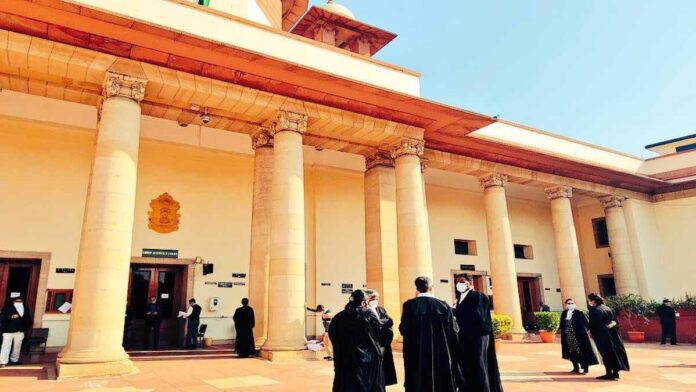In a significant ruling on judicial appointments and internal institutional autonomy, the Supreme Court of India has upheld a Delhi High Court rule that permits only retired judicial officers from the Delhi Higher Judicial Service (DHJS) to apply for designation as Senior Advocate before the Delhi High Court.
The Court rejected a Special Leave Petition (SLP) filed by Vijai Pratap Singh, a retired judicial officer from Uttar Pradesh, who had challenged Rule 9B of the High Court of Delhi (Designation of Senior Advocate) Rules, 2024. The rule explicitly bars retired judicial officers from other states from seeking designation in Delhi.
Petitioner Challenged Rule as Discriminatory
Singh, appearing as party-in-person before the apex court, argued that the rule violated Article 14 of the Constitution, which guarantees equality before the law. He claimed that Rule 9B created an unconstitutional sub-classification among retired judges — favouring those from Delhi while excluding equally qualified individuals from other states.
However, the Supreme Court bench, comprising Chief Justice B.R. Gavai and Justice K. Vinod Chandran, declined to entertain the plea. Instead, CJI Gavai suggested that Singh could approach the Supreme Court for designation, where no such restrictions apply. With no further discussion, the Court dismissed the petition.
Delhi HC Had Already Justified the Rule
Earlier, the Delhi High Court had upheld the constitutionality of Rule 9B. It explained that designation as a Senior Advocate is a process that demands more than just reviewing a service record — it also involves evaluating the advocate’s demeanor, stature, and conduct, which are best known to the judges of the same court where the individual served.
The High Court had also noted that senior advocate status is not merely honorary, but a position of professional distinction akin in many ways to the stature of a sitting judge. Therefore, the rule restricting applications to Delhi’s own retired officers was justified.
Importantly, the Court ruled that the classification was based on intelligible differentia and served a rational purpose — namely, to maintain the credibility and integrity of the evaluation process. As such, it did not violate Article 14 of the Constitution.
Key Takeaways from the Judgment
- Institutional familiarity is essential when considering candidates for senior designation.
- Courts are within their rights to frame rules that restrict applications based on territorial and administrative considerations.
- The Supreme Court’s refusal to intervene reaffirms the principle of judicial self-governance.
- Qualified individuals from other states are not left without recourse — they may apply to other forums such as the Supreme Court, which has more inclusive eligibility criteria.
- Case Title: Vijai Pratap Singh vs. Delhi High Court Through Its Registrar General
- Case Number: SLP(C) No. 15148/2025




